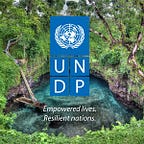From a high school teacher to a biomass gas plant operator
How a UNDP-supported project changed the life of one woman and altered the renewable energy landscape in Samoa forever
Written by Laufaleaina Lesa, UNDP Samoa, Communications Analyst
After more than a decade as a college teacher, you couldn’t ask for a more drastic career change than becoming a plant operator at the nation and region’s only biomass gasification plant.
But that was exactly the case for Ruta Falaniko Utupo, a 34-year-old mother of one from the village of Sagafili at Mulifanua, who gave up her day job of 12 years to begin work as an operator at the Afolau Biomass Gasification Plant, located in her village.
It was a choice that the former Nuuausala College teacher said she has not regretted since.
“I love what I do now. I enjoyed teaching too, but I did that for such a long time and I wanted a change. Being a plant operator has given me the chance to pursue something different and I now have the opportunity to learn new skills and acquire new knowledge,” said Ruta, who began in her new role a little over a year ago.
Ruta is the only female worker amidst five full-time operators at the plant, plus 24 casual workers — all men — who operate various functions at the plant daily.
The Afolau Biomass Gasification Plant is an $11.3 million Samoan Tala project that was commissioned in November 2020, and which heralded the beginning of a new era in renewable energy efforts in Samoa and the Pacific region.
It also ushered in a new reality for Ruta when she joined the plant as one of its first batch of workers, after undergoing three months of training.
The plant uses wood from invasive plant species that surround the facility. Biomass gasification is a process whereby wood chips are dried before feeding them inside a gasifier which, without oxygen, produces syngas at very high temperatures. The gas produced is then cooled down and pumped into generators to produce electricity that will feed into the Electric Power Corporation’s grid.
Since its official commissioning last year, the Plant has contributed about 750 kilowatts per hour into the national grid over three months.
The construction of the Plant was a key activity under the IMPRESS — Improving the Performance and Reliability of Renewable Energy Power Systems in Samoa — Project. The project was funded by the Global Environment Facility (GEF) via the United Nations Development Programme (UNDP), and the European Union and the Government of Germany’s Government Agency of International Cooperation (EU-GIZ ACSE). The project is implemented by the Ministry of Natural Resources and Environment, Ministry of Finance, Electric Power Corporation (EPC), and the Samoa Trust Estates Corporation (STEC).
The IMPRESS Project, which began in 2018 and is set for completion in 2022, aims to improve the sustainable and cost-effective utilisation of indigenous renewable resources for energy production in Samoa.
It has implemented a number of activities that range from policy changes to offering scholarships at the National University of Samoa for those interested in studying renewable and sustainable energy.
The IMPRESS Project management unit is housed with the Ministry of Natural Resources and Environment.
A key activity of the IMPRESS Project, is advocating for the use of natural alternatives to produce biogas to be used at household level. One such system has been installed as is now operational in the village of Sa’asa’ai in Savaii.
A similar system, using pig waste to produce biogas, has been set up at the Methodist Church’s Atina’e or Development at its headquarters at Faleula on the outskirts of Apia.
The site started out as a piggery that the church can use for food during its large gatherings such as its annual conference in July. But thanks to IMPRESS, it has now been transformed into a biogas hub, which has added biogas to the list of its offerings to the church, to power their gas stoves, especially ahead of its major conference this year.
Two representatives from the church, who look after the piggery, Lemoa Peyne and Pene Metusela have been trained by specialists funded under the IMPRESS Project.
Fonoti Perelini is the Chief Technical Advisor to the IMPRESS Project. He has vast experience in engineering and energy development, having also worked as a consultant for various parts of the Pacific Region. His role is to ensure that the IMPRESS Project is on track in meeting its target indicators as per project deliverables to its objectives.
Usufono Fepuleai is the expert used to construct biogas systems on allocated sites under the Project. He has more than 10 years experience in the development of biogas and has successfully installed biogas systems around the Pacific & Asian regions.
The ready-made biogas system used at the piggery was bought from China. Other biogas sites has to install their own systems from scratch using bricks and mortar, but this option means that it’s easier and faster to have these biogas systems in place.
As for Ruta Falaniko Utupo, her career change has paid dividends for her in more ways than she could have imagined.
“I am now not only a certified biomass gas plant operator, but have also undergone various trainings including one for First Aid, which is also very useful for my family. This new role has opened up a realm of new possibilities for me and I am very excited about it,” said Ruta.
